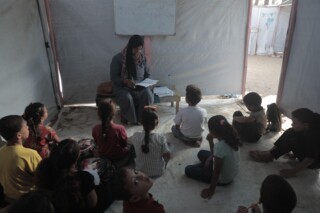Education is resistance
Malaka Shwaikh
Last month, my sister, her husband and their three children returned to their damaged flat in northern Gaza after enduring almost thirteen months of forced displacement. My sister said that her four-year-old son struggles to walk on tiles and nearly fell while using the unfamiliar stairs. Since May 2024 they had been living in a tent, which provided little protection against intense heat, cold or heavy rains. One day they were flooded. At other times they faced severe food shortages. None of this stopped them setting up a school at the camp.
My sister sent photographs of children sitting on wooden chairs in a large tent, sharing their books, listening to their teachers. In a recent phone call my mother told me that education has continued in both formal and informal settings throughout Gaza since October 2023. My father has always taught me that ‘education is resistance.’ When he was temporarily detained by the Israeli authorities as a university student, he used the time for studying. Other relatives, facing longer jail terms, pursued their education in prison. When I received a partial scholarship for my master’s degree in the UK in 2013, my parents were ready to sell some of their possessions to pay the rest of the fees.
Last April, Save the Children reported:
All schools in Gaza have been closed for 625,000 students for six months. According to the Ministry of Education, as of 2 April, more than 5479 students and 261 teachers have been killed in the Gaza Strip since 7 October.
UN experts spoke of ‘scholasticide’, an ‘intentional effort’ by Israel ‘to comprehensively destroy the Palestinian education system’. Some educational institutions managed to keep going online, but many students had no internet access, as well as suffering from the scarcity of food, water and shelter. The price of flour in Gaza reached $350 a kilo. Many thousands of children have malnutrition. Thousands of others have been injured. Thousands more have lost at least one of their parents. Children are suffering from depression, grief and fear.
Donald Trump’s remarks on Tuesday, 4 February, particularly his claim that ‘we will own’ Gaza, amount to a call for ethnic cleansing. He also pledged to extend Joe Biden’s funding ban for the United Nations Relief and Works Agency (UNRWA). The US used to be the largest contributor to UNRWA, providing annual donations of $300 million to $400 million. I attended UNRWA schools in Gaza for nine years, and recognise that the agency role’s is not uncontroversial in Palestinian society; but I have also experienced firsthand the critical role it plays in offering education and essential services to millions of Palestinians. It is profoundly disheartening to realise that the assistance I once received will no longer be accessible to my family and community.
‘It was a comprehensive curriculum,’ my father told me of the tent school my family set up. My aunt taught there too. There were drawing and painting classes as well as maths and science. My nephews and niece had ‘resumed their reading skills and are actively engaging with texts once more. They also have assigned homework. And when aid is provided to Gaza, a portion of it has been allocated to support students, encouraging them to continue their education.’
Nearly 90 per cent of school buildings have been destroyed or damaged by Israeli attacks. Some of those still standing have been used as temporary accommodation for people who have lost their homes. After the ceasefire was announced, local authorities in Gaza asked that some school buildings be vacated to allow tens of thousands of students to prepare for their general secondary school examinations, including those who missed them last year.
The ceasefire brings mixed emotions. There is bittersweet comfort in the idea of being able to return home, even to devastation. I am grateful that my sister has found her apartment damaged but habitable: she is ‘in a better position than those who have entirely lost their homes’, she says. I am happy that her children, and others, can once again enjoy the beach, and should soon return to school. I am ready to mourn those we have lost. There is a sense of relief in having the time and space to grieve.
The ceasefire should mark a pivotal moment rather than a temporary pause, a chance to stop the devastation and create a foundation for enduring justice. As the slow and expensive work of rebuilding Gaza begins – the UN estimates that it will take $50 billion and at least a decade – education should be among the priorities.
